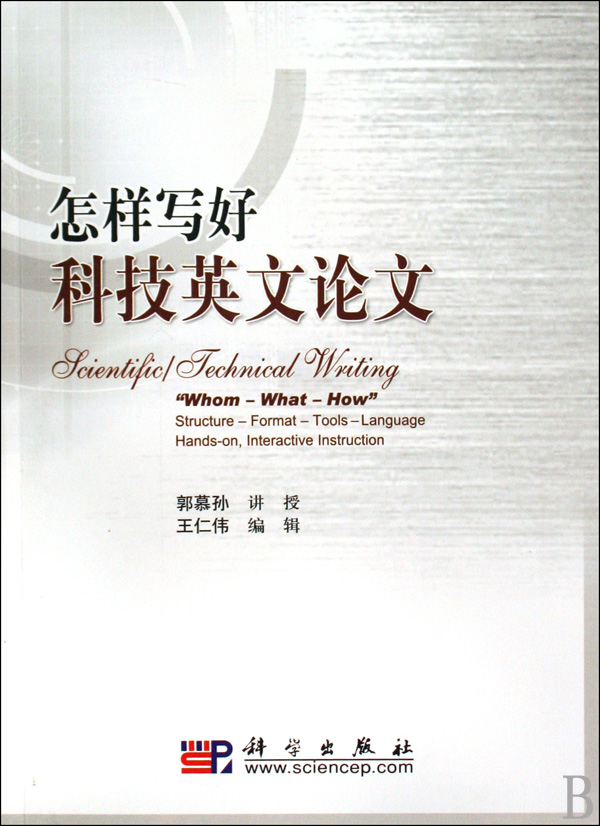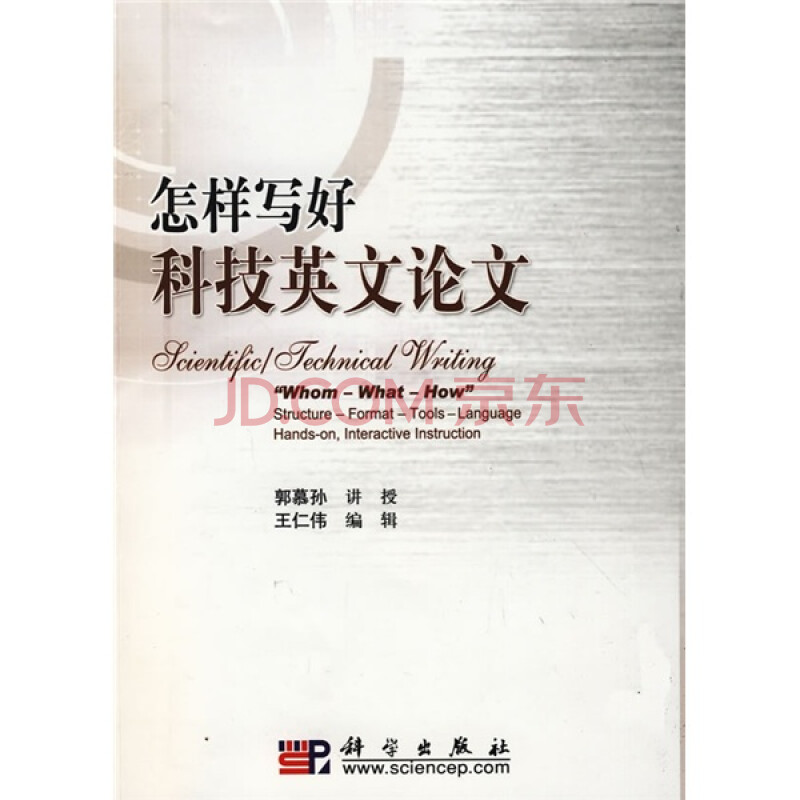【www.gbppp.com--私藏美文】
You need some help? Some people say essays are tricky. Here are some helpful hints to make them less difficult。
你需要帮助吗?有人说,论文很难写。这里有一些有用的提示,可帮助你克服写作中的困难。
1. Take your prompt and pick it apart! Understand exactly what it is asking you to do. If it says evaluate, then you conclude, if it says to compare or contrast then do that. Take notes!
1. 抓住主题,深刻领会!准确理解它要求你做什么。如果说是写评价,那么你就得出结论,如果说是比较或对比,那么就照此去做。务必要作好笔记!
2. Look over whatever the prompt addresses and begin to pick that apart based on what your prompt is asking for, and do not discriminate yet, take all of it. Take notes on ideas for the prompt, and mark pages in any literature you may be using。
2. 认真审核主题到底要说明什么,然后根据你的主题要求开始提炼选材,但选材不拘一格,多多益善。为主题观点做好笔记,并标记出你可能使用的任何文献的章页。
3. Look at the prompt and the information you've gathered and begin to group ideas together so you can create a working thesis. The working thesis will give your essay a focus so you don't digress in the middle of your writing。
3. 根据主题和你收集的信息,开始将观点组合在一起,这样你就可以创建一个写作大纲。写作大纲将突出你的重点,以便你在写作中不会偏离主题。
4. Continue your brain-storming and write the topic sentence for your first body paragraph. Make sure it provides a focus for your paragraph and it isn't general. Find examples from life (direct quotes, paraphrasing, etc。) or from the topic literature that you can use in your first body paragraph. Make sure it follows your working thesis, but don't actually write the paragraph yet。
4. 开动脑筋精益求精,写出第一个主体段的总起句。确保它成为你第一个主体段的重点,而不是泛泛而论。从生活中(直接引用,转述等)或同一主题文献中找到可以用在你第一个主体段的的范例。确保它与你的写作大纲一致,但先不要正式写这个段落。
5. Do the same for the other body paragraphs.5. 依次处理其他主体段落。
6. Write your concluding statements for each paragraph. Please note that it is a CONCLUDING statement, meaning you need to bluntly say what point you are trying to make and lead it into your next body paragraph。
6. 写出每个段落的总结性语句。请注意,这是总结语句,也就是说你要直截了当地说明你想阐述的观点,并将其引入下一个主体段。
怎样写好英语议论文
由于我们学习的英语文化环境比较淡薄,学生在英语作文写作方面颇感吃力,英语议论文写作更是难上加难。为此,本人特就议论文写作方面谈点看法,希望对初学者有所帮助。
要想写好议论文,必须掌握好议论文的有关知识:1、主要结构:引论——本论——结论;2、三要素:论点、论据、论证;3、论证方式:立论、驳论;4、主要论证方法:事实论证、道理论证、事实与道理相结合论证等。 议论文写作,首先要明确写作要求,再根据要求确定论证方式,继而采用恰当的论证方法,运用相应的论据对论点进行论证。
高考议论文通常采用三段式的论证模式。引论部分,首先针对某一社会现象提出主张或看法,或分析存在的一些问题。本论部分,首先确定论证方式,再用恰当的论证方法,运用事实论据或道理论据对论点进行论证。结论部分,即通过严密的分析与论证之后,总括全文,阐述主张或提出解决问题的方法。
为了防止写作时出现汉语式的英语及避免语言错误的发生,议论文写作时要尽量套用常用的英语词语、短语和句型。议论文不同的部分阐述的侧重点不同,因此每一部分能套用的词语和句型亦有所区别。
第一部分,套用相关句型来引出议论。
1.Recently, our class have had a heated discussion about whether…….
2.These years, some students are interested in ……
3.Now, some people hold the view that……
4.I’m writing to tell you about the discussion we have had about……
5.There are two opinions on it.
6.Opinions are divided on the question.
第二部分,采用关联词和句型列举事实依据,采用正反对比或归纳推理的方法,证明所持观点的正确性及表明其所持的态度。
1.Besides,/In addition, /Apart from it, /What’s more, /Above all,……
2.For example, …… /There are ……, such as……and so on.
3.On one hand, …… on the other hand, ……
4.First, …… Second, …… Third, ……
5.On the contrary, /However, /While……/But……
6.At the same time, we should ……
7.If ……, I believe we will ……
8.As we see, /As we all know, /As far as I know, ……
9.Of all students, 40% of them think ……, but others do not agree.
10.Some people believe that ……, but others say /consider that ……
11.Some students are for the idea /are in favor of it /agree to it, while /but /however others are against it /disagree to it.
第三部分,引用表示因果关系的关联词语、总结性的语句强调和重申提出的观点,或者引用某些特定的短语和句型来揭示观点、礼貌地征求对方的建议。
1.In a word, ……/ In short, ……/In brief, ……
2.As a result, ……/Therefore, ……
3.No doubt doing something is ……/There is no doubt that ……
4.So in a word, we should ……, only in this way can we ……
5.Generally speaking, most students think we should ……
6.In fact, /As a matter of fact, we can ……
7.So, for something, I suggest that we should do …….
8.In my opinion, I think ……
9.I have my own view about it, I think ……
10.Personally, I believe it is ……
11.Now, we really don’t know what to do about it. Could you tell us some good advice and help us out?
除了学会套用一些常用的句型和短语外,还需要扎实地掌握一定量的英语基础知识,根据书面表达题的具体内容和要求,灵活地选用句式“There be”、强调句式“It is „ that „”、省略句式“if necessary”、动词的非谓语形式“to do something /doing something“等。另外,根据句子语气的需要,可在英语句中适当地增加一些情态动词“should /can /may /had better/must”,以及句与句之间合理使用一些并列、递进、转折等关系的关联词语,这样,议论文的结构会更加严谨,更具说服力和感染力。
如何写好英语议论文
对立观点式
A. 有人认为X 是好事,赞成X, 为什么?【如何写好英文论文】
B. 有人认为X 是坏事, 反对X,为什么?
C. 我的看法。
Some people are in favor of the idea of doing X. They point out the fact that 支持X 的第一个原因。
They also argue that 支持X 的另一个原因。
However, other people stand on a different ground. They consider it harmful to do X. They firmly point out that 反对X 的第一个理由。
An example can give the details of this argument:
There is some truth in both arguments. But I think the advantages of X overweigh the disadvantages. In addition to the above-mentioned negative effects it might bring about, X also may X 的有一个坏处。
2. 批驳观点式
A.一个错误观点。
B. 我不同意。

Many people argue that 错误观点。
By saying that, they mean 对这个观点的进一步解释。
An example they have presented is that 一个例子。
(According to a survey performed by X on a group of Y, almost 80% of them 赞成这个错误观点或者受到这个错误观点的影响)。
There might be some element of truth in these people's belief. But if we consider it in depth, we will feel no reservation to conclude that 与错误观点相反的观点。
There are a number of reasons behind my belief. (以下参照辩论文的议论文写法)。
3. 社会问题(现象)式
A.一个社会问题或者现象
B. 产生的原因
C.对社会和我们生活的影响
D. 如何杜绝。(如果是问题的话)
E. 前景的预测。来源:恒星英语学习网
Nowadays, there exists an increasingly serious social/economic/environmental problem. (X has increasingly become a common concern of the public). According to a survey, 调查内容说明这种现象的情况。(或者是一个例子)。 There are a couple of reasons booming this problem/phenomenon.下面参照辩
论式议论文写法。
X has caused substantial impact on the society and our daily life, which has been articulated in the following aspects. 参照辩论式议论文的写法。
A dozen of measures are supposed to take to prevent X from bringing us more harm. 同上
Based on the above discussions, I can easily forecast that more and more people will „„ ◇
语言点提示: has drawn„, realized, and provided resort to借助、诉诸、求助于 negative effects副作用、反面作用 addicts成瘾者、依恋者 fantasy world虚拟世界、虚幻世界 pornography色情表演、色情作品 fraud欺骗、
诈骗【范文】
With the development of science and technology, people depend more
and more heavily on the computer. Then how does the computer affect our life?
On the one hand, it can be very helpful to people who need it and treat it
correctly. The computer can broaden our knowledge about the world. It can also help us learn more about many fields of studies quickly: science, medicine, arts and so on. It is very convenient to people who are busy with their jobs, and has brought about many positive changes in our lives. On the other hand, the computer may bring about some negative changes. For example, many children become so addicted to computer games that they stay up late frequently and even neglect their studies. Another disadvantage is that computer's radiation is harmful to people's eyes, especially to children's.
Just as every coin has two sides, the computer has advantages and
disadvantages. I think that if we can overcome its negative effects, we can bring it into full play.
说明:本文是哈佛化学与化学生物学学院G. M. Whitesides教授研究小组内部分发的论文写作方法,从中我们不但可以学到如何有效的写作论文,而且可以学到一个科研小组是如何协作完成论文的写作。
Whitesides Group: Writing a Paper
George M. Whitesides
Department of Chemistry and Chemical Biology, Harvard Uni
versity, Cambridge, MA 02138, USA
1.What is a scientific paper?
A paper is an organized description of hypotheses, data and conclusions, intended to instruct the reader. Papers are a central part of research. If your research does not generate papers, it might just as well not have been done. “Interesting and unpublished” is equivalent to “non-existent.”
[科技论文是集假说、数据和结论为一体的概括性描述]
Realize that your objective in research is to formulate and test hypotheses, to draw conclusions from these tests, and to teach these conclusions to others. Your objective is not to “collect data.”
[研究的目的是为了形成并证实假说,得出结论,不是简单的数据收集。]
A paper is not just an archival device for storing a completed research program, it is also a structure for planning your r
esearch in progress. If you clearly understand the purpose and form of a paper, it can be immensely useful to you in organizing and conducting your research. A good outline for the paper is also a good plan for the research program. You should write and rewrite these plans/outlines throughout the course of the research. At the beginning, you will have mostly plan; at the end, mostly outline. The continuous effort to understand, analyze, summarize, and reformulate hypotheses on paper will be immensely more efficient for you than a process in which you collect data and only start to organize them when their collection is“complete.”
[论文并不仅是收集研究结果,也有助于形成进一步的研究工作的框架][好的文章提要也是研究工作的好计划,在研究的过程中,应该反复修改这些计划或提要。研究工作开始时,应有完善的计划;工作结束时,应充分的总结。]
2.Outlines
2.1 The reason for outlines.
I emphasize the central place of an outline in writing papers, preparing seminars, and planning research. I especially believe that for you, and for me, it is most efficient to write papers from outlines. An outline is a written plan of the organiza
tion of a paper, including the data on which it rests. You should, in fact, think of an outline as a carefully organized and presented set of data, with attendant objectives, hypotheses and conclusions, rather than an outline of text.
[按照提纲进行写作是最有效的方法][提纲是一篇论文的行文计划,应该包括论文所依靠的数据。提纲不仅仅是列出各段的内容, 而是按照目的, 假说, 结论来精心组织数据。]

An outline itself contains little text. If you and I can agree on the details of the outline (that is, on the data and organization), the supporting text can be assembled fairly easily. If we do not agree on the outline, any text is useless. Much of the time in writing a paper goes into the text; most of the thought goes into the organization of the data and into the analysis. It can be relatively efficient to go through several (even many) cycles of an outline before beginning to write text; writing many versions of the full text of a paper is slow.
[在我们就提纲达成一致以前,写正文是没有意义的][在动笔前,详细讨论几遍写作提纲会提高写作效率;写很多遍正文反倒很慢]
All the writing that I do - papers, reports, proposals (and, of course, slides for seminars)- I do from outlines. I urge you to learn how to use them as well.
2.2 How should you construct an outline?
The classical approach is to start with a blank piece of paper, and write down, in any order, all important ideas that occur to you concerning the paper. Ask yourself the obvious questions:“Why did I do this work?” “What does it mean?”“What hypothesis did I mean to test?”“What ones did I actually test?”“What were the results?”“Did the work yield a new method or compound? What?”“What measurements did I make?”“What compounds? How were they characterized?” Sketch possible equations, figures, and schemes. It is essential to try to get the major ideas written down. If you start the research to test one hypothesis, and decide, when you see what you have, that the data really seem to test some other hypothesis better, don't worry. Write them both down, and pick the best combinations of hypotheses, objectives and data. Often the objectives of a paper when it is finished are different from those used to justify starting the work. Much of good science is opportunistic and revisionist.
[找一页空白的纸,以任何顺序,写下与这篇文章有关的所有重要观点][自问一些显而易见的问题][如果你的研究开始是为证实一个假设,然而当你发现你有的数据仿佛真的可以更好地验证其它的假设时,你也不必担心。把它们两者都写出来,去选择假设,目的和数据的最佳组合。] When you have written down what you can, start with anoth
er piece of paper and try to organize the jumble of the first one. Sort all of your ideas into three major heaps (A-C).
[试着草拟一份提纲。将你的观点分成三大类]
A) Introduction
Why did I do the work? What were the central motivations and hypotheses?
[为什么我要做这件工作,主要的目的和假设是什么?]
B) Results and Discussion
What were the results? How were compounds made and characterized? What was measured?
[结果是什么?化合物是怎样合成与表征的?测试方法是什么?]
C) Conclusions
What does it all mean? What hypotheses were proved or disproved? What did I learn? Why does it make a difference?
[所有这一切意味着什么?证实或否定了什么假设?我学到了什么?结果为什么与众不同?]
Next, take each of these sections, and organize it on yet finer scale. Concentrate on organizing the data. Construct figures, tables, and schemes to present the data as clearly and compactly as possible. This process can be slow - I may sketch a figure 5-10 times in different ways, trying to decide how it is most clear (and looks best aesthetically).
(转载)写好英语(中文)科技论文的诀窍
二零零七年六月一日于印地安那
写好英语(中文)科技论文的诀窍
周耀旗教授文/写好英语科技论文的诀窍:
主动迎合读者期望,预先回答专家可能质疑
周耀旗
印地安那大学信息学院
印地安那大学医学院计算生物学和生物信息中心
以此文献给母校中国科技大学五十周年校庆
我的第一篇英语科技论文写作是把在科大的学士毕业论文翻译成英文。当我一九九零年从
纽约州立大学博士毕业时,发表了20多篇英语论文。但是,我对怎样写高质量科技论文的
理解仍旧处于初级阶段,仅知道尽量减少语法错误。之所以如此,是因为大多数时间我都
欣然接受我的博士指导老师Dr. George Stell和Dr. Harold Friedman的修改,而不知道为
什么要那样改,也没有主动去问。这种情况一直持续到我去北卡州立大学做博士后。我的
博士后指导老师Dr. Carol Hall建议我到邻近的杜克大学去参加一个为期两天的写作短训
班。这堂由Gopen教授主办的短训班真使我茅塞顿开。第一次,我知道了读者在阅读中有他
们的期望,要想写好科技论文,最有效方法是要迎合他们的期望。这堂写作课帮我成功地
完成了我的第一个博?••••••5A3?••••••后基金申请,有机会进入哈佛大学Dr. Martin
Karplus组。在哈佛大学的五年期间,在Karplus教授的指导下,我认识到一篇好的论文需
要从深度广度进行里里外外自我审查。目前,我自己当了教授,有了自己的科研组,也常
常审稿。我觉得有必要让我的博士生和博士后学好写作。我不认为我自己是写作专家。我
的论文也常常因为这样或那样的原因被退稿。但是我认为和大家共享我对写作的理解和我写作的经验教训,也许大家会少走一些我走过的弯路。由于多年未用?形男醋鳎氪蠹叶喽嘀刚@葱徘爰模?yqzhou@iupui.edu。 欢迎访问我的网站:http:
//sparks.informatics.iupui.edu。
导言
通常来讲,研究生和博士后从他的导师那儿得到研究方向。经过多次反复试验,得到一些
好的结果。接下来他们需要对得到的数据进行总结和分析,写成论文。一篇精写的论文更
容易被高档杂志接受。而写得不好的论文很可能被退稿。论文的数量和质量是学生和导师
事业发展的敲门砖。不成文,便成仁,是学术生涯的写照。
很多学生以为当结果到手的时候研究就结束了。他们写的草稿,常常把原始数据放在一起
,没有对方法和数据进行详细分析,没有对当今论文的评述。事实上,写作是研究不可分【如何写好英文论文】
割的一部分。此刻是弄懂方法的成功与失败,寻找结果的解释及其隐含的意义,以及与其
他相关研究进行比较的时候。【如何写好英文论文】
我们为什么需要在写作上如此认真努力?原因很简单。一个研究结果只有在被别人使用时
才有意义。而想被别人使用,文章必须能引起其他科学家的兴趣,而且得保证其他人能看
懂并可以重复和再现你的结果。只有可以被理解的研究才会被重复,也只有可以被再现的
工作才能导致别人的引用和跟踪。而你的论文被引用的数量常常用来衡量研究的影响力。
从某种角度看,写作就象是把你的工作成果推销给其他的科学家。
为了更好的推销,科学论文必须满足它独特的顾客:由聪明能干的科学家组成的尖端读者
。它必须能先说服(通常也是竞争对手的)同行们,因为他们的评审是文章在发表前的第
一道关口。同时,它也必须满足一般读者的要求。为了达到这个目标,我们首先要理解他

们需要什么?
读者需要什么
你的文章的潜在读者可能有刚进入这领域的新手,大学生和研究生,也有专家(潜在审稿
人),他们对你的领域会有不同程度的了解。因此,写文章的时候应该力求简单到可以被新
手理解,同时深刻到可以引起专家的兴趣。
所有的科学家(不论是学生还是他们的导师)往往都很忙。大量期刊杂志使他们不可能仔细
阅读每一篇论文。他们通常希望能在最短时间内找到文章最重要的信息。典型的情况是如
果文章标题不吸引人,他们或许就会跳过这篇论文,如果文章的摘要没有包含重要的新方
法或新结果,他们不会去读这篇文章。即使已经决定要读的论文,他们也会跳过很多段落
直接去找自己最感兴趣的地方。因此,保证文章的结构能使读者很快找到所需的信息非常
重要。文章的关键在于结构,不在于语法。语法错误易改,结构错误则往往让人无从下手
,不知所云。我审过一些国内同行的论文,结构问题很常见。
总之,一篇文章只有在不需太多努力就可以理解的情况下才会被广泛地引用。文章清晰的
关键就是使读者能在他们想找的地方找到他们需要的东西。这也就是说,要想让读者不费
力理解你的论文,你必须费力去满足他们的期望.
读者期望什么
读者对句子的期望
本文来源:http://www.gbppp.com/jd/435278/
推荐访问:英文论文怎么写 怎样写好论文